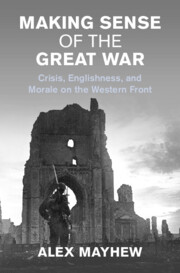Book contents
- Making Sense of the Great War
- Studies in the Social and Cultural History of Modern Warfare
- Making Sense of the Great War
- Copyright page
- Dedication
- Contents
- List of Figures
- List of Tables
- Acknowledgements
- Abbreviations
- Map of the Western Front
- Prologue
- Introduction
- Part I The Environment
- Part II Social Groups
- Part III Crisis and Morale
- 5 Hoping for Peace
- 6 Experiencing Crisis
- Conclusion
- Appendix Demographics of Six English Regiments in the BEF
- Bibliography
- Index
Conclusion
from Part III - Crisis and Morale
Published online by Cambridge University Press: 11 April 2024
- Making Sense of the Great War
- Studies in the Social and Cultural History of Modern Warfare
- Making Sense of the Great War
- Copyright page
- Dedication
- Contents
- List of Figures
- List of Tables
- Acknowledgements
- Abbreviations
- Map of the Western Front
- Prologue
- Introduction
- Part I The Environment
- Part II Social Groups
- Part III Crisis and Morale
- 5 Hoping for Peace
- 6 Experiencing Crisis
- Conclusion
- Appendix Demographics of Six English Regiments in the BEF
- Bibliography
- Index
Summary
Perception, habit, and innate coping mechanisms are important features of military morale. Soldiers during the Great War relied, like anybody, on the information available to them as they made sense of their experiences. Their sensemaking was constrained by what they could see, what they could hear, and what they were told. Subtler influences also informed how they navigated the world, and these were often drawn from their cultural and social context, not to mention their surroundings. In this way, morale was nurtured (and sometimes destroyed) at the confluence of men’s physical world, their social groups, and their psychologies. Some of the components of morale morphed as time passed, but military morale rested, to a great extent, on the ability of individuals to cope with great stresses and unimaginable horrors. The army provided them with many of the tools, resources, and mechanisms that helped them to do so but, significantly, it appears that so long as victorious peace appeared likely (and necessary) men were willing to confront crisis, both acute and chronic. Of course, individuals had their breaking points, but resilience and endurance were the norm. Whilst this narrative hinges on the power of the human spirit, there were features of English infantrymen’s morale that were unique to them: their very specific local identities and patriotism, and their lack of a explicit political identity, which was a key feature of their sensemaking. English infantrymen’s perception of military service was not interwoven with their sense of citizenship. These parochial patriotisms were potentially less vulnerable to change than more pronounced political identities.
- Type
- Chapter
- Information
- Making Sense of the Great WarCrisis, Englishness, and Morale on the Western Front, pp. 282 - 296Publisher: Cambridge University PressPrint publication year: 2024



